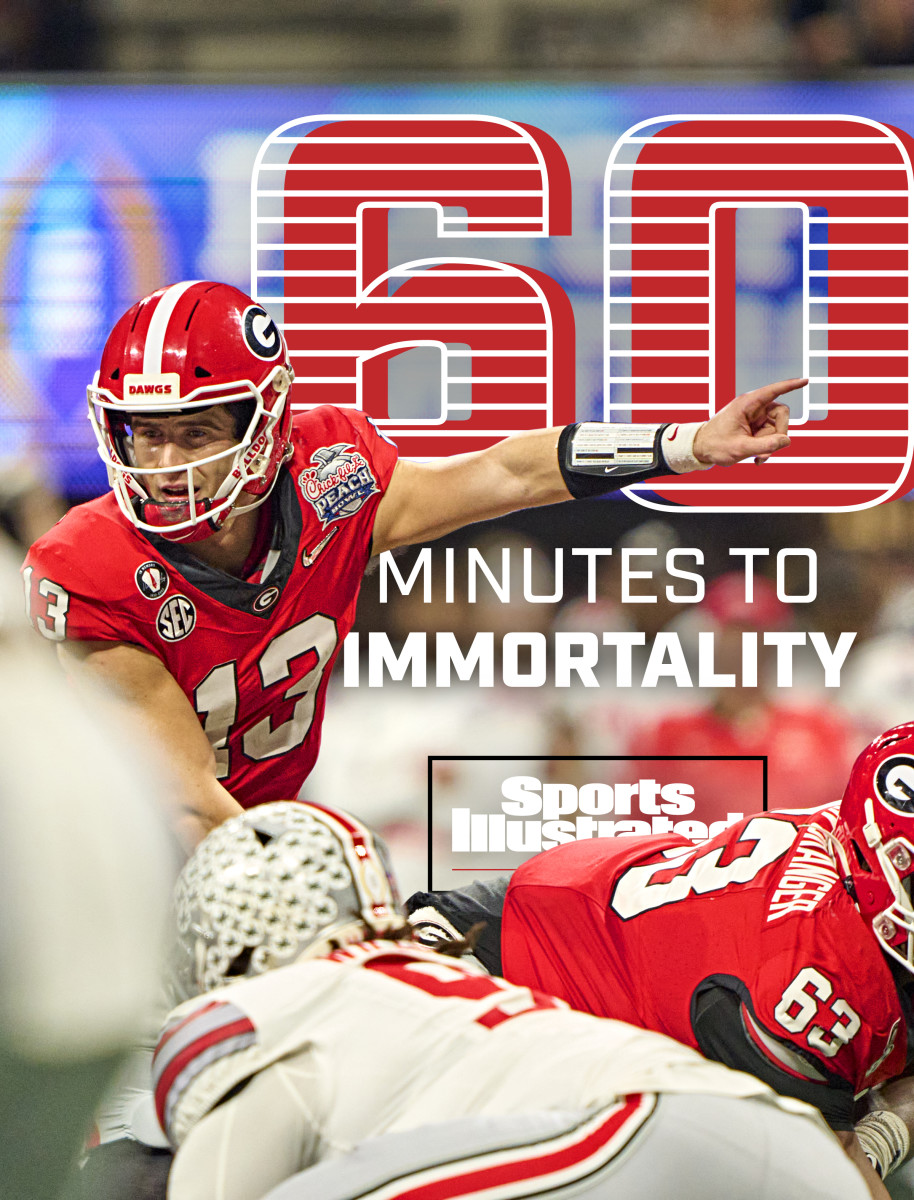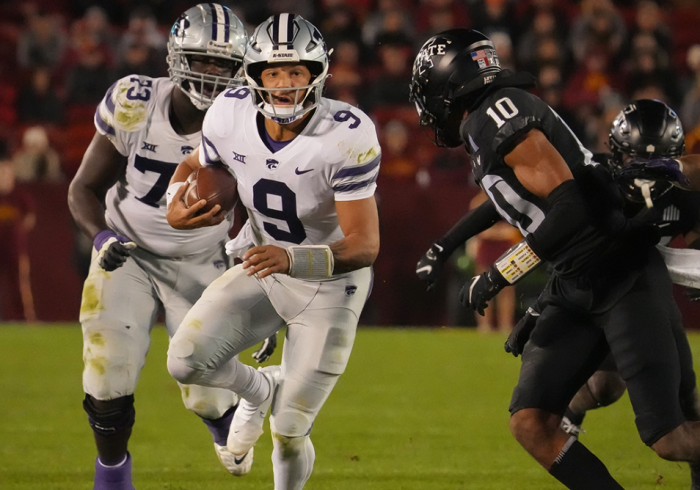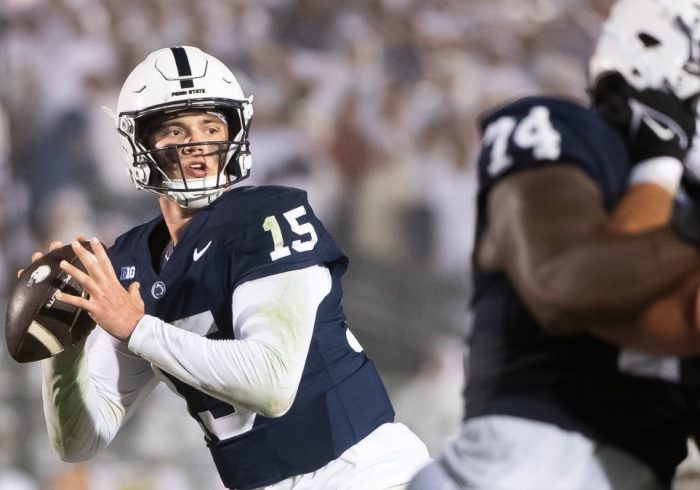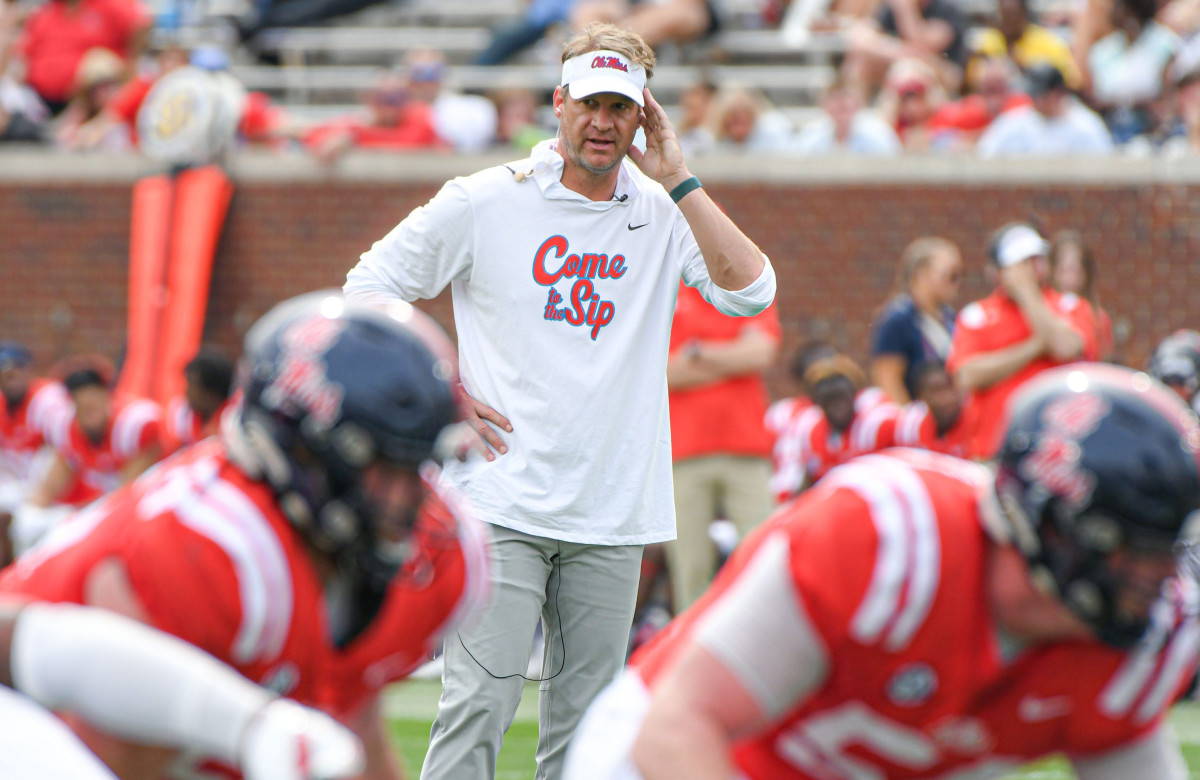One more game. Stetson Bennett will pull on the silver britches and the “G” helmet a final time Monday, culminating a Georgia career that has surpassed even his most grandiose childhood dreams growing up in Blackshear, Ga., a minuscule map dot 220 miles south of Athens.
There will be emotions to compartmentalize, but getting through his final home game in Sanford Stadium was the tougher task. At age 3, Stetson told his father he wanted to be the quarterback for the Georgia Bulldogs. In high school, he cried at the stadium reception that was part of his official campus visit. He walked on as a Bulldog, walked off to junior college after one season, then came back—because he got a scholarship, yeah, but mostly because he loves the place.
Monday, though, is more about business than nostalgia. A national championship is on the line. Against TCU in SoFi Stadium, Bennett will attempt to elevate his legacy one more rung up the ladder—from ignored to doubted to celebrated to memorialized as Georgia’s greatest quarterback, and as an all-time college football great.
For real. The résumé is difficult to dispute.
At the quarterback position, the school has produced Pro Football Hall of Famer Fran Tarkenton and No. 1 draft pick and Super Bowl winner Matthew Stafford. It has fielded four-year starters Aaron Murray, Eric Zeier and David Greene, who own large sections of the Georgia record book. But Bennett is rewriting some of those records, and he’s done something none of those quarterbacks accomplished by winning a national title. Another championship could be on the way.
“He should be considered the best quarterback in Georgia history,” Murray, the school’s career passing yards leader, said on SEC Network last month.
A higher level of history beckons now. If Bennett leads the Bulldogs past the Horned Frogs in the College Football Playoff championship game, he will be just the fifth quarterback in the past 50 years to start for back-to-back national champs. The others: Alabama’s A.J. McCarron in 2011 and ’12; USC’s Matt Leinart in ’03 and ’04; Nebraska’s Tommie Frazier in 1994 and ’95; and Oklahoma’s Steve Davis in ’74 and ’75.
Tim Tebow didn’t do it at Florida, winning titles in 2006 (as a backup) and ’08. Ken Dorsey came within a pass interference flag of doing it at Miami in ’01 and ’02. Stetson Bennett is 60 minutes away from accomplishing what they did not, joining that elite list.
None of those four back-to-back QBs went on to NFL greatness. Leinart was a top-10 draft pick who started 18 NFL games; McCarron was drafted in the fifth round and made four NFL starts. Both players had prototype NFL size and skills. Option quarterback Frazier played just one game in the Canadian Football League. Davis, who operated Oklahoma’s wishbone offense, did not have a pro career.
Bennett will have a chance to make a mark in the NFL. This will not be received well by a segment of the population that seems weirdly antagonistic toward him. Some think he is overrated; some simply have Stetson fatigue; some are too cynical for the poetry of it all; some might be jealous. (Former Tennessee quarterback Erik Ainge referred to Bennett as “a punk” on a Knoxville radio station this week, perhaps embittered because his decent college career from 2004 to ’07 suffers by comparison.)
The many critics who have simply refused to admit Bennett is very good at playing quarterback were in a high dudgeon over him being a Heisman Trophy finalist. (Bennett finished fourth in the voting, the highest by a Georgia player in 30 years.) They’re going to have to come to grips with this part next: He is widely expected to be drafted.
Bennett lacks prototypical size (he’s generously listed at 5’11”), but has the passing ability, acumen and athleticism to get a shot. Multiple NFL scouts told Sports Illustrated they expect him to hear his name called come late April.
“He’s an NFL guy,” one says. “He’s a backup. He will get drafted. Obviously very instinctive, a good athlete that runs well, has enough arm. The guy makes impressive throws and has big balls. He’s absolutely getting taken; I say sixth round. [Former Georgia quarterback Jake] Fromm went in [the fifth round], and the talent level isn’t much different.
“He’s tiny. He doesn’t fit the profile of the film-junkie clipboard-holder for 10 years. He loves playing ball, but I think the kid will get bored as a third QB.”
Says another scout: “I do think he can be a backup for someone. I don’t know how long he lasts, meaning he can be someone’s backup in a cost-controlled situation. But once you start paying someone a little more, you probably want better. There are some teams, though, where once you get in the door and establish yourself as reliable, you almost get some tenure, and they don’t get rid of you, like Cooper Rush in Dallas. So maybe he gets himself a setup like that.”
Regardless of what happens in the NFL, he will have quite the setup in his home state whenever his career ends. Being Stetson Bennett will carry a lifetime of advantages, even though he arrived in Athens six years ago with none of them built in.
He had to earn it all.
Bennett is looking to win his second straight national championship with the Bulldogs.
Kevin D. Liles/Sports Illustrated
The Stetson Bennett story is now worn smooth as a stone in the Oconee River. Georgia fans can recite it by heart: how Bennett was given jersey No. 22 and half a locker; given no real chance at moving up the depth chart despite excelling on the scout team; went to junior college and was ready to sign with Louisiana-Lafayette when a scholarship was offered at the 11th hour; returned and was continually passed over by someone else for the starting job; then finally got a shot due to injury and never let the position go last season.
“I had the guts to go chase it,” Bennett says, “and then chase it more once I realized that I’m not there yet.”
In 2020, first-year offensive coordinator Todd Monken didn’t think Bennett was good enough, and Bennett didn’t think Monken was fair enough in his assessments. Eventually, they came to an understanding that has since become a great relationship—Bennett was good enough but still had a lot to learn, and Monken had a lot to teach.
“All we did was try to bury him for the couple of years he was here, and all he did was continue to fight and compete,” Monken says. “And he had every reason to say, ‘You know what, I’m gone’ in today’s day and age in the portal and guys leaving. He didn’t do that. He wanted to be a Georgia Bulldog, wanted to be the quarterback for the Georgia Bulldogs.
“I think that we’ve come out the other side probably better collectively. He’s very prideful, and we wouldn’t be where we’re at without him. And collectively we’ve improved. I’ve done a better job of coaching him. He’s done a better job of accepting that part of it.”
And now, at the end of a six-year career that only includes two and a half seasons of meaningful action, none other than Stetson Bennett is on the verge of becoming Georgia’s single-season passing yardage leader and career pass-efficiency leader (he already has the season record in that category, set last year). Bennett surprised some people with his decision to stay in college for a sixth year, taking advantage of the extra season of eligibility afforded by the NCAA due to the COVID-19 pandemic. But the results speak for themselves beyond the record book: a potential title repeat; name, image and likeness opportunities that have made him rich for his age; and improved draft stock after a spectacular season.
This season Monken has unleashed his most creative and aggressive offense yet. He and coach Kirby Smart trust Bennett to let it rip.
That trust has been rewarded. But there were some dicey moments before Georgia’s heroic moments against Ohio State in the Peach Bowl semifinal game on New Year’s Eve. By Bennett’s own reckoning, he played “30 minutes of bad football” against the Buckeyes. He threw one interception and sailed at least two other passes into harm’s way. He appeared unsettled and indecisive at times—two unusual traits for him—unnerved by either the Ohio State rush or coverages. It was looking bleak for the Bulldogs when they headed into the fourth quarter down two touchdowns, 38–24, and running 15 points below their season scoring average.
In the Mercedes-Benz Stadium stands, Stetson’s family was fighting through the undulations of emotion. His mom, Denise, had “gotten into a fuss”—as she puts it in her syrupy South Georgia drawl—earlier in the game with one of her other sons, Maverick. He had gone to sit with his friends, but texted her later that he was sorry for the disagreement, fearing that “Stetson can feel our energy” and they were negatively impacting his play.
Pro scouts who spoke to SI say Bennett has the football mind to be drafted into the NFL.
Kirby Lee/USA TODAY Sports
(This, comically, is what happens when family, and other fans, desperately want to affect an outcome they cannot control. Mundanities like seating arrangement become toweringly important.)
Before the game, Denise received a text from Ohio State quarterback C.J. Stroud’s mom, Kim. It was a prayer for the competing QBs to have good health. The two women had bonded in New York over the weekend of the Heisman Trophy ceremony, along with the mothers of winner Caleb Williams and runner-up Max Duggan. They texted each other through bowl season, all of them understanding, appreciating and empathizing over their sons’ journeys.
“They’re accomplished young guys who have the weight of the world on them,” Denise Bennett says. “They have people say horrible things about them sometimes. We all understood each other.”
This time, with the game going poorly in Atlanta, Denise at least managed to stay in her seat. Last year, during the excruciating national championship game against Alabama, she had to abandon her spot for the concourse in Lucas Oil Stadium, overcome with stress. “It wasn’t as bad as that,” she says. “But it was bad.”
Eventually—inevitably—it would be good. So good.
Like the national championship game last January, this season’s Peach Bowl drama was the entire Stetson Bennett Experience distilled to a single game. He was fallible enough to tempt Georgia fans and unbiased observers to declare that he couldn’t do it … and then he was determined and confident enough to prove he could do it after all. He never stops slinging.
“It’s football, and there’s always something that you don’t know that’s going to happen,” Bennett says. “And it’s cliché that it’s not over until that fat lady sings. And you owe it to your teammates more. If you give up, it’s almost a selfish thing because people out there are relying on you. You’re not just playing for yourself. So there really wasn’t an option but to keep going. And things worked out and we played really well at the end.”
How well? Bennett completed 11 of 13 passes in the fourth quarter, leading three scoring drives to put his team ahead, 42–41, in the final minute. Nicknamed “The Mailman” back in high school, he delivered yet again. But the last drive was so efficient—five passes, five completions—and so speedy, it gave Ohio State time to hustle into field-goal position.
When Noah Ruggles pushed a 50-yard attempt very wide left, Bennett sprinted onto the field with his arms outstretched. He quickly realized there were still a few seconds on the clock and ran back to the sideline, pumping a fist. As he grabbed his helmet to take the field, take the snap and take a knee to end the game, he was fighting back tears.
His endless, and endlessly improbable, Georgia career wasn’t over yet.
Many signs like this one in Bennett’s hometown of Blackshear, Ga., have displayed messages of support for the Bulldogs’ quarterback.
Courtesy of Patrick Jones
Back in Blackshear, they’re readying for the final scene in their own small-town drama. The message board out front of Blackshear Elementary School this week reads:
Priority Mail to L.A.
Mailman’s Final Delivery
A whole lot of South Georgia is migrating to Southern California for this finale. Family friend and huge Georgia fan Patrick Jones, who famously brought a well-aged bottle of Pappy Van Winkle bourbon to last year’s national championship and gave Stetson the first swig, will be there again this time. Stetson’s parents and siblings will all be there as well, with Denise and the kids planning to make a weekend of seeing the sights in Hollywood and beyond. “We’re going to be all goo-goo-eyed,” she joked.
The screenwriters in Tinseltown might one day want to take a swing at The Stetson Bennett Story. It’s that good. Denise Bennett appreciates that but also has a point to make about how it has evolved, or should have evolved, as her son became a bona fide star.
“It’s a very thankful position to know that it went as far as it can go,” she says. “Not many people can go out like that. I can see that it’s an amazing story, but I can see that he’s so much more than that story. He is a dang talented quarterback. I love the story. I love a good movie. But I think people have underestimated his talent. The talent makes the story.”




